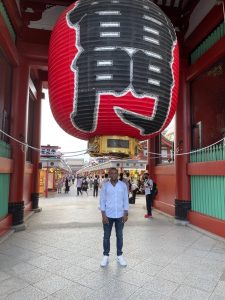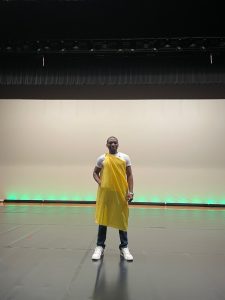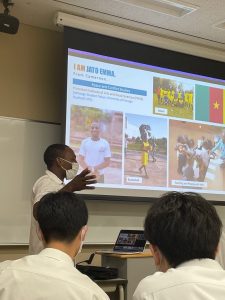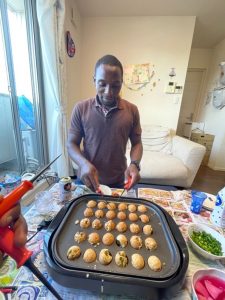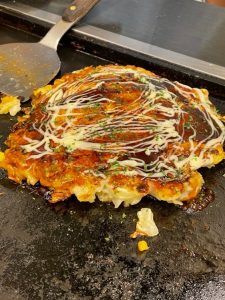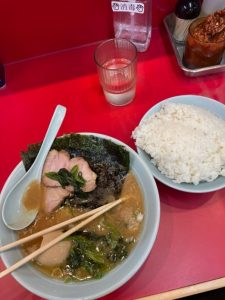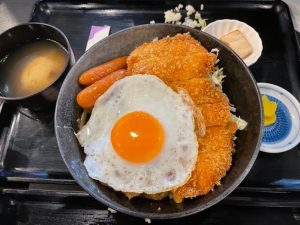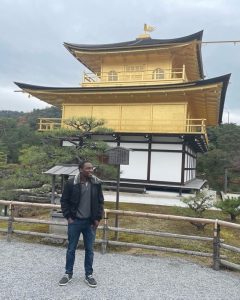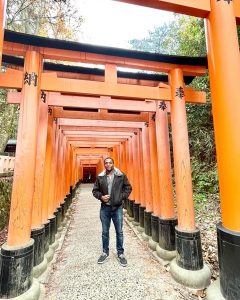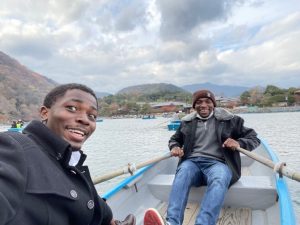[Study in Japan Report] By Jato from PIASS
Wepngong Jato EMMANUEL our former exchange student from Protestant Institute of Arts and Social Sciences, Rwanda, who studied in Japan from Mar. 2022 to Feb.2023 wrote an essay of his one year stay in Japan.
Wepngong Jato Emmanuel
A Report about my Life in Japan
ACKNOWLEDGEMENT
First and foremost, I would like to express my sincere appreciation and gratitude to God for granting me His protection and journey mercies to Japan and back to Rwanda. My profound appreciation to my home university, the Protestant Institute of Arts and Social Sciences (PIASS), for having a memorandum of understanding with Tokyo University of Foreign Studies Japan, who hosted me for the exchange program from April 6th, 2022, to February 27th, 2023, In my view, it was a unique and pleasant opportunity to study in an advanced country and to use the opportunity to network and broaden my perspective for my future endeavors.
Moreover, I cannot forget the immense contributions of Prof. Kazuyuki Sasaki, who assisted us in the processing of our documents, the exchange division for constantly checking on me to know how I am doing, and the staff of the African Study Center for the warm reception accorded me and other exchange students during our stay in Japan. Again, I would like to extend my gratitude to the donors of the crowdfunding and the JASSO scholarship that supported my stay in Japan and IAfP who supported my flight ticket for this exchange program. Not forgetting the students majoring in Africa Area Studies for their support in making my stay enjoyable. Besides, I appreciate the new friends and families I made in Japan.
INTRODUCTION
Studying abroad has been one of my greatest wishes, as I anticipated that it would be an opportunity to familiarize myself with a new environment, learn a new culture, network, and gain an international experience that could shape my future career, and I really appreciate that I got the opportunity to study at the Tokyo University of Foreign Studies. As a result, I set up some personal objectives to achieve during my stay in Japan. These include; understanding Japanese culture and learning the basics of the Japanese language to understand the peacebuilding process and promotion in Japan to experience learning in an advanced environment and finally to build a network for future endeavors.
This report includes all programs and activities in which I participated in achieving all or part of my stated objectives. It will also tackle some of the courses that I took and how they impacted me.
Some of the Courses that I took during my exchange period
After being selected for the ISEP-TUFS, it has boosted my interest in knowing more about the peacebuilding process in Japan, from the violence and trauma of WWII to the current peaceful state and economic development of the country. Besides, Japan addresses its historical and current issues with the US, such as the atomic (nuclear) bombing of Hiroshima and Nagasaki and the Okinawa peace movements, over the establishment of US military bases and its international relations. This made me develop an interest in courses that address some of this issue in the spring semester.
The course on Pan-Africanism and African Unity gave me inside information on the following issues: the historical origins and development of the Pan-African ideology and movement, the feasibility of the African Union’s Agenda 2063 for African Unity, the debates about the “United States of Africa” and the “United Africa of States” projects, and how the Pan-African ideology and action have evolved over time. In the course of Aspect of Japanese History, I learned about A History of Japanese Radicalism and Counterculture, from 1945 to Fukushima, and how Japanese people demonstrated in a large number and in such diversity for the first time. It broadens my understanding of how some changes came about in Japanese society.
Moreover, in the course of Collective Memories of Jewish People in Texts and Films, I learned about religious films (the film Unorthodox and the story and biography of Deborah Feldman). Feldman was raised under the insular community’s strict guidelines, which governed everything from what she wears, reads, eats, and goes. She also noted that “every rule they designed was an extreme interpretation of a Jewish law; she was the voice of the voiceless. Her story is painful but has a happy ending. Feldman regains herself as a human being by giving or digging deep into the closed and repressive society. Also, the Holocaust (the memories of survivors, basic information about the Holocaust, and the film The Zookeeper’s Wife In addition, I gained more insight about the primacy of gender attribution, cross-cultural perspectives on gender, gender role or genital inspection, and gender identity in the course Introduction to Gender: The Cultural Construction of Gender in Comparison.
Furthermore, I took the course Theory and Practice of International Cooperation, Culture, and Arts. During this course, we watched different movies that express Japanese culture, and the movie for my group was “Whisper of the Heart.” At the end of the course, we were task to write a script and shoot our own movie, which we titled Time Travel to tell the story of Japan 100 years ago.
During the fall semester, I took courses on Refugee and Forced Migration, Aspects of Contemporary Japan (Social Welfare Problems and Issues in Japan), where the focus was on Gender Inequality, Prejudice and Discrimination: Racial and Ethnic Inequality, Invisible Children and Poverty (I was surprised that some children express poverty in a developed country like Japan), and Social Justice in Japan. In Aspect of Japanese History 2, I learned about the institutional mechanisms of migrants’ illegalization in Japan, how Japan exploited the Philippines, the relationships between Japan and Vietnam, Korea, and Japan, the Fukushima accident, and the lawsuit. In the course of intercultural communication, I studied about culture, which is the shared ways in which groups of people understand and interpret the world. Types of nonverbal communication, High and Low Context Communication Styles, Monochronic Time and Polychronic Time, Collectivism and Individualism, Power Distance, Culture Shock, Clear, Effective Communication These made me sensitive to my own culture and other cultures.
Additionally, I took a course in Peace Building we studied causes of conflict, Human security, The role of the UN is inclusiveness on the local politics, Humanitarian Dilemma. Speech, and Communication where we had debates about some certain issues of Japan, like: should Japan have nuclear weapons to keep the balance of political power?, teenagers in Japan should use their electronic devices freely, male employees should take maternity leave when a child is born?, high school education in Japan should be mandatory?, Japanese citizens should have the freedom of giving up their rights to vote?, senior high school uniforms should be abolished in Japan?, and senior high school students should have the freedom to dye or par their hair? And finally, African Studies 2 was about Islam and power in the Great Lakes Basin, where we studied about the Pillars of Islam, Pillars of Faith, who is Muslim, the School of Law, Islam, Religion and Politics, Religious Syncretism, Isamization, and Arabization, the Impact of Civilization Mission, Islam and power (after Cameroon, Chad, and Nigeria’s independence), as well as Islam and globalization.
In summary, all of these courses that I took impacted and broadened my perspective on the world, as well as increased my understanding of some issues as well deeper understanding of international relation regarding the rights of refugees, the relation Japan had with some countries and how they are cooperating with some nations, social issues in Japan, religion and so on.
Activities Outside Classroom
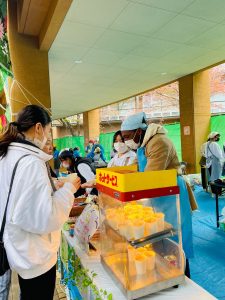 On the other hand, the exchange program was not only about learning from the class room. I also endeavor to perform and participate in some activities outside classroom.
On the other hand, the exchange program was not only about learning from the class room. I also endeavor to perform and participate in some activities outside classroom.
I visited some places like the shrines and temples to learn about Japanese Religion and culture like the Fushimi, Kinkaku-ji(Temple of the Golden Pavilion) and Arashiyama in Kyoto, the Okunitama Shrine and Asakusa in Tokyo.
I also had experience at the Chofu Jindaijimotomachi Onsen, I enjoyed the sea side at Yokohama and learned some history at the military towel. In addition, I ate some Japanese traditional food and learned to prepare some of them and I love the food with the taste and flavors.
Furthermore, during the TUFS festival, I assisted the Freshmen who major in Africa studies to serve Bussa and Maffe a soup from Senegal. Moreover, I used this time to practice my Japanese with the Japanese who came to have a taste of one of the African dishes prepared by the Japanese students. The name of the stand was Njoo.
I consider theater as one of the means of communication where you can easily pass an important message to your audience. Also, I use theater to promote peace. It was during the school festival preforming with students majoring in African students at TUFS, I improved my intercultural understanding with the students. The play was about Nunda. They were a Sultan who had seven sons and he didn’t like the seventh son because he was always in the kitchen. He also had a large garden where he planted a date tree.
During my free time I attend the club activities of TUFS create, drama club, futsal, basketball and soccer club. Sometime I go to play soccer with veteran club with people from different parts of the world and I also, learn different cultures and improve on my Japanese language skills. To further increase my interaction and spiritual growth I attended church services at Calvary Chapel on Sundays. I also participated in the program “Feel Africa” organized by African Study Center and IAfP where the African students at TUFS where to exhibit photos which tell a story about their country and Africa. My photos focus on culture, market situation and daily life style in Cameroon. During this period, I shared my experience with students from different parts of the world who came to the stands about PIASS, Cameroon and Africa as well.
Besides, I had the opportunity to have an intercultural exchange with some junior high school and high school student as well as some elementary school pupil because one of my goal was to understand the educational system of Japan. I had fun with some friends while playing with the snow when it failed in Tokyo by making the snowman.
Moreover, I met some African youths during one of the soccer games from Angola, Cameroon, Sudan, South Sudan and Mozambique we shared ideas on how we can network to contribute for the promotion of peace in our various countries and Africa. From the experienced gained within the period I stayed in Japan, and with my interactions with Japanese natives, as well as with other exchange students, I commend that the people there are very generous, proactive and helpful. They are lovers of nature, and outdoor activities. I have also doubled my skills and competencies on punctuality, time management, following essential skills which will serve as an added advantage to my career growth and development, getting use to professional working environment as well as strengthened my confidence. I also loved and imitated the positive life style and hardworking nature of Japanese.
Conclusion
I found this exchange program elevating and rewarding experience. It is not just an academic adventure but also so many lessons to learn about life. I anticipate to keep my network, and to use the skills and competence I have gained to impact my community as well.

